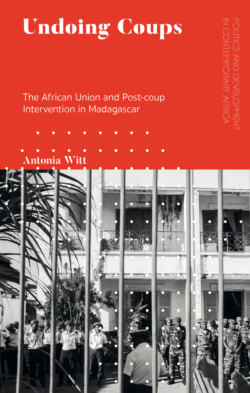Отрывок из книги
Politics and Development in Contemporary Africa
Published by one of the world’s leading publishers on African issues, ‘Politics and Development in Contemporary Africa’ seeks to provide accessible but in-depth analysis of key contemporary issues affecting countries within the continent. Featuring a wealth of empirical material and case study detail, and focusing on a diverse range of subject matter – from conflict to gender, development to the environment – the series is a platform for scholars to present original and often provocative arguments. Selected titles in the series are published in association with the International African Institute.
.....
This book follows an inductive and exploratory approach. The selection of Madagascar as case study was therefore driven less by theoretical than by research-pragmatic criteria (Schwartz-Shea & Yanow 2012: 70). Nevertheless, this choice crucially influenced what kind of insights this book presents, and thus it requires transparency and reflection. Chapter 7 will discuss in more detail to what extent the case can be regarded at the same time as unique and as part of a larger pattern of post-coup interventions. There were three reasons that made studying the case of Madagascar particularly advantageous when I started researching for this book in 2011. First, the fairly long duration of re-establishing constitutional order in Madagascar and the high number of international, regional, and national actors involved in this process meant that there was an abundance of empirical material to be gathered in textual form but also in the form of direct accounts of the protagonists involved. This made the case particularly suitable for single-case research. Madagascar is also one of the few cases that was dealt with twice under the AU’s anti-coup policy (in 2001/2002 and 2009), allowing for a historical comparison but also for reflection on how preceding experiences shape both interveners’ practices and perceptions and trust on the part of local parties, as I explain in Chapter 4 in more detail. Second, unlike some other countries that have experienced African regional post-coup interventions, in Madagascar there was neither a situation of violent conflict (as in Mali or the Central African Republic) nor was the country affected by the Ebola crisis (as Guinea later was). In short, not only the abundance, but also the accessibility, of empirical material was crucial. Third, and most importantly, the choice of Madagascar allowed for studying post-coup interventions synchronically (i.e. while the intervention happened). Concretely, this meant, for instance, that my field research in Madagascar (see further below) coincided with the official re-establishment of constitutional order, which made it possible to gather conclusive narratives about the parties’ experiences with and assessments of the almost five years of re-establishing constitutional order in the country. It also allowed me to participate in events such as press conferences of international election observers and the first meeting of the international contact group on Madagascar after the official return to constitutional order. These were events of collective interpretation and assessment of what had happened since March 2009, which also allowed for observing and encountering interveners on the ground. So, apart from availability and access, the expected quality and comprehensiveness of the empirical material also played a crucial role for choosing the case of Madagascar.
.....
